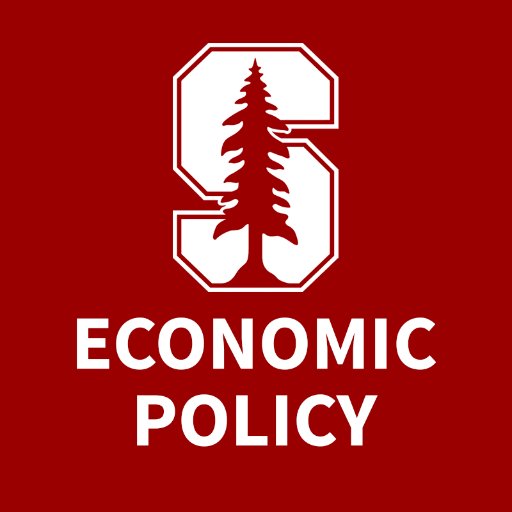
Stanford Institute for Economic Policy Research
@SIEPR
Followers
40K
Following
757
Media
649
Statuses
3K
The official account of the Stanford Institute for Economic Policy Research, @Stanford's home for addressing economic policy challenges around the globe.
Stanford, CA
Joined August 2015
Recommended read: @econJaredB's case for why a guaranteed jobs program funded by a "tiny tax" on the #MagnificentSeven's valuations might be in order as #AI shakes up the labor market. Also in link below, his take on Amazon's robot dreams. #FutureofWork
#BigTech
1
1
3
Fascinating study from SIEPR's Luigi Pistaferri shows how parents adjust their wealth after children lose their jobs, and that their exact response depends on how long their kids are likely to be out of work. Summary 👇
Insuring labour income shocks: The role of the dynasty Andreas Fagereng @AndreasFagereng @HandelshoyskBI, Luigi Guiso @EIEF_Rome, Luigi Pistaferri @SIEPR @Stanford, Marius Ring @mariusring @Yale
https://t.co/gyTfCwxABo
0
0
1
This was part of a promise, explains co-author @HershShefrin. With new U.S. family policies underway, Fuchs' perspectives “are as resonant today as they were during his lifetime.” Read ➡️ https://t.co/Paa4wATIUt for more on the enduring voice of the SIEPR senior fellow,
siepr.stanford.edu
A working paper that the longtime Stanford health economist drafted more than 35 years ago tying child-care subsidies to women’s economic equality sees the light of day.
0
1
2
In the absence of gov't jobs data, this matters more than ever: In 2022, SIEPR's @erikbryn and his @DigEconLab worked with ADP to produce near real-time employment stats. Everything you need to know about about this work, and how it compares to @BLS_gov, is here. 👇
adpresearch.com
How representative is ADP employment data?
0
2
1
New in #QJE: How state-level policies inadvertently fueled the opioid epidemic, from Matthew Gentzkow, SIEPR senior fellow and @stanfordimpact faculty director, and @MIT coauthors. MIT news summary 👇 #OpioidCrisis #PublicHealth
1
0
0
New research from SIEPR Senior Fellow @HannoLustig sheds light on how declining real interest rates over time have contributed to wealth inequality. Study ends with good news for young and low-income households going forward. 👏 #Economics #EconTwitter #WealthInequality
1/The richest Americans have more duration in their portfolio than the rest. That's why inequality ⬆️ when r ⬇️
0
3
9
Regional banks in Arizona and Utah are reviving concerns about the U.S. banking system. SIEPR's Amit Seru, in a @FT op-ed, explains the "uncomfortable arithmetic policymakers keep wishing away" and what should be done to correct it. Gift link 👇
1
0
1
ICYMI, ideas for how government can make life affordable again, from @nealemahoney and @econJaredB: https://t.co/PX5DlCPUC7
If you're looking for a smart Sunday read, recommend @chao_becky and @mtkonczal's Affordably Framework. Strong overlap with @econJaredB and my piece on the prices side, and an important treatment of the income side too.
0
2
7
Great explainer👇linking China's "techno-wizardry" to its macroeconomic malaise, from SIEPR's Scott Rozelle and @KennedyCSIS in @ForeignPolicy.
In China, the high-tech push has not translated into maintaining rapid growth and a stronger macroeconomy. https://t.co/V3tgADApv2
0
1
1
(2/2) 🎓U.S. universities added more master's programs, and int'l and American students, especially in STEM fields. 💲Chinese master's students ➡️ higher tuition revenues for U.S. schools, but did not cause tuition hikes. 🏙️College-town economies also benefited as demand
0
0
1
(1/2) Good things happened to U.S. higher education after China started producing more college grads and they continued their studies abroad, finds a new study by Hongbin Li, director of the SIEPR-sponsored @StanfordSCCEI, and @YuliXu7 of @StanfordSAPARC. 👇Key takeaways👇
nber.org
1
2
4
Investments in homeless shelters pay off. 👇 New research from SIEPR's @markduggan_econ and @DerekChristo4, along with Olivia Martin, former SIEPR research assistant now at Stanford RegLab.
Leveraging seasonal variation in homeless shelter availability in Los Angeles County finds that temporary shelter significantly reduces crime and ER visits for psychiatric conditions, from Derek A. Christopher, @markduggan_econ, and Olivia H. Martin https://t.co/nJi6mktAn2
0
0
2
🫧 Tulips in the 1600s, dot-coms in the 1990s, housing in the 2000s. All investment bubbles that burst, wreaking economic havoc. @econJaredB explains on @NPR why the #AI frenzy could be next. Link 👇
1
1
1
Intriguing coda here: @saumjha, SIEPR senior fellow, finds in a companion study that, given 2 opposing policy approaches on climate change, people like the #AbundanceAgenda's focus on clean energy investment, sustainable housing, and economic growth.
New research from @saumjha suggests that exposure to financial markets and opportunities to directly engage with investment platforms and decision-making—when presented correctly—can increase support for action on climate change.
0
2
3










